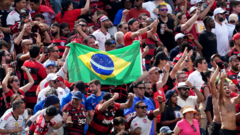What’s Behind Brazilian Clubs' Success at the Club World Cup?

The Rise of Brazilian Football in the FIFA Club World Cup
In an exhilarating display of talent and determination, Brazilian football has once again captured the world's attention at the FIFA Club World Cup. With four teams—Botafogo, Flamengo, Fluminense, and Palmeiras—making a remarkable showing, the tournament has sparked a surge of excitement among fans across Brazil. Their performances beg the question: can a Brazilian team claim the title for the first time since 2012? In this article, we will explore the factors contributing to Brazilian teams' success, the unique circumstances surrounding this year's tournament, and what it means for the future of both club and national football in Brazil.
The Current Landscape of the FIFA Club World Cup
As the tournament unfolds, Brazil finds itself in a position of strength. Historically, Brazilian teams have dominated the FIFA Club World Cup, winning the prestigious title four times. However, the last victory came in 2012, leading to an expectation for a resurgence in Brazilian football. The current squad of teams from Brazil has shown remarkable skill and resilience, as evidenced by some stunning results:
- Botafogo defeated European champions Paris Saint-Germain.
- Flamengo turned a 1-0 deficit into a 3-1 victory over Chelsea.
- Fluminense and Palmeiras held Borussia Dortmund and Porto, respectively, to impressive draws.
These matches have propelled all four Brazilian teams into the knockout stage, igniting fervent discussions among fans and experts alike about the potential for a Brazilian team to reclaim the title.
The Importance of Timing and Preparation
One critical aspect contributing to the success of Brazilian teams is the timing of the tournament. Unlike their European counterparts, who are winding down their seasons, Brazilian clubs are in the midst of their domestic league competitions. This unique situation allows the teams to maintain peak physical condition and morale, essential factors in high-stakes tournaments like the Club World Cup.
As Brazilian sports journalist Renata Mendonca notes, "The timing of this competition is very good for South American teams. They are in the middle of their season, they are very well prepared physically." This mid-season advantage allows Brazilian clubs to showcase their best players, many of whom have returned to their home clubs after stints abroad.
Adapting to the Climate: An Unforeseen Advantage
The climate in the United States has also posed a challenge for teams from Europe, who are not accustomed to the soaring temperatures. Coaches like Chelsea's Enzo Maresca and Manchester City's Pep Guardiola have pointed out that high heat makes training difficult and impacts player performance during matches. Conversely, Brazilian players are more acclimated to such conditions, giving them a potential edge in the tournament.
Botafogo's right-back Vitinho, who previously played in England, emphasized the advantage: "We're used to it. I hope that it works in our favour." This familiarity with the climate may play a crucial role as Brazilian teams continue to progress in the tournament.
Financial Investment and Coaching Quality
Another factor contributing to the success of Brazilian teams is the increased financial investment in the sport. There has been a noticeable rise in the standard of Brazilian football, attributed in part to the influx of foreign coaches. With two of the Brazilian teams being led by Portuguese coaches, the incorporation of diverse tactics and strategies has improved overall performance. Vickery notes that "there is more money in Brazilian football," which has allowed clubs to invest in better coaching and player development.
Moreover, Brazilian clubs have managed to retain key players who might have otherwise left for European clubs. Notable signings include Flamengo’s acquisition of Jorginho and Botafogo's retention of Igor Jesus, showcasing the clubs' ability to attract and keep talent.
The Cultural Impact of Brazilian Football
Football is more than just a sport in Brazil; it is a cultural phenomenon that unites millions. The excitement surrounding the Club World Cup has resulted in a palpable buzz across the nation. Tim Vickery, a South American football expert, captures this sentiment: "Every bus stop, every water cooler... everyone is talking about it. It's full-on." Tens of thousands of fans have traveled to the United States to support their teams, contributing to vibrant atmospheres at matches and showcasing the deep-rooted passion for football in Brazil.
What Lies Ahead for Brazilian Teams?
As the tournament progresses, the stakes are higher than ever. With an all-Brazil showdown between Palmeiras and Botafogo, at least one Brazilian team is guaranteed a place in the quarter-finals. Flamengo faces Bayern Munich, while Fluminense takes on Inter Milan, presenting further opportunities for Brazilian clubs to shine on the world stage.
The implications of a successful Club World Cup run extend beyond club glory. If a Brazilian team wins, it could serve as a powerful statement regarding the overall strength of Brazilian football and its potential impact on the national team as they prepare for the upcoming World Cup.
Examining the Future of Brazilian Football
While the current success of Brazilian clubs is noteworthy, it raises questions about the future landscape of football in Brazil and South America. Vickery highlights the impact of foreign players on Brazilian teams, noting that many key players for Brazilian clubs are not Brazilian citizens. This trend has sparked a new dynamic in South American football, where clubs are increasingly relying on talent from neighboring countries to maintain competitiveness.
This shift could have lasting implications for the Brazilian national team, as the integration of diverse talents may enrich the overall quality of play. However, it also emphasizes the importance of investing in and nurturing homegrown talent to ensure the continued success of Brazilian football.
Conclusion
The FIFA Club World Cup has provided an exciting platform for Brazilian teams to showcase their skills and resilience, reigniting hopes of a championship victory after over a decade. With a combination of favorable timing, climate adaptation, financial investment, and passionate support from fans, Brazilian clubs have positioned themselves as formidable contenders in the tournament.
As the tournament reaches its climax, it remains to be seen whether a team from Brazil can reclaim the title. Regardless of the outcome, the current success of Brazilian clubs serves as a reminder of the nation's rich footballing heritage and the potential for future greatness on both club and national stages. Will this success pave the way for Brazil to not only win the Club World Cup but also the World Cup next summer? Only time will tell.
FAQs
What teams from Brazil are participating in the FIFA Club World Cup?
The teams from Brazil participating in the FIFA Club World Cup are Botafogo, Flamengo, Fluminense, and Palmeiras.
When was the last time a Brazilian team won the FIFA Club World Cup?
The last time a Brazilian team won the FIFA Club World Cup was in 2012.
How does the timing of the tournament affect Brazilian teams?
Brazilian teams are in the middle of their domestic league season, allowing them to maintain peak physical condition and morale, unlike European teams that are concluding their seasons.
What impact does the climate have on the teams during the tournament?
The high temperatures in the United States pose challenges for European teams, while Brazilian players are more accustomed to similar conditions, giving them a potential advantage.
What role do foreign players and coaches play in Brazilian football's success?
The influx of foreign players and coaches has raised the standard of Brazilian football, providing clubs with diverse strategies and helping to retain local talent.
The journey of Brazilian football in the FIFA Club World Cup is a testament to the resilience and passion of its players and fans. Can Brazilian teams reclaim their former glory? Only time will tell, but the excitement is palpable. #BrazilianFootball #FIFACLubWorldCup #FootballFever
Published: 2025-06-26 18:49:22 | Category: sport



